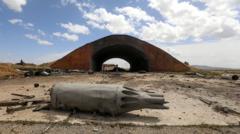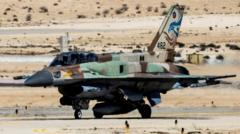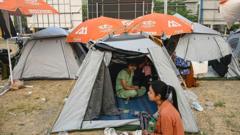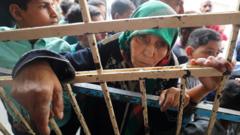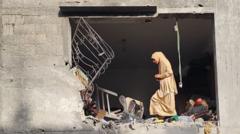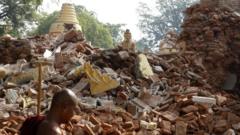The Shia militant group, once a formidable force, now confronts a challenging future in a politically fractured Lebanon.
**Hezbollah Faces Existential Crisis in Wake of Recent Military Setbacks**
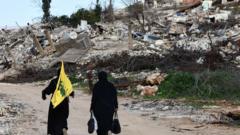
**Hezbollah Faces Existential Crisis in Wake of Recent Military Setbacks**
As the fallout from last year's conflict continues, Hezbollah grapples with declining power and internal dissent.
Hezbollah, the powerful Lebanese militia and political organization, finds itself at a critical juncture following a devastating war that has left its reputation and resources in tatters. In the aftermath of last year's conflict, which erupted in September, the group contends with internal dissatisfaction from supporters disillusioned by the scale of destruction in southern Lebanon and a lack of reconstruction funding.
In a tragic incident, a nurse named Adam, who was alerted by a pager distributed by Hezbollah, experienced a horrific explosion that left him severely injured. The clandestine operation revealed that the devices had been rigged with explosives by Israeli forces, marking a significant shift in the conflict's dynamics. Adam, along with many others affected by the blasts, continues to harbor loyalty to Hezbollah despite his injuries, viewing them as tributes to a righteous struggle.
The group's formidable military capacity has been significantly diminished due to the Israeli bombardment and the assassinations of key leaders, including the long-standing figurehead Hassan Nasrallah. The political landscape has also altered, with Lebanon's new president pledging to affirm the military's dominance, indirectly challenging Hezbollah's armed status. Compounding the group's challenges, Iran's support, historically critical for Hezbollah's funding and logistics, is under strain due to regional upheavals.
In interviews with residents of southern Lebanon, support for Hezbollah seems to withstand the war's aftermath, but muted criticisms emerge regarding the organization's military priorities and strategy. The deep scars left on communities and the lack of actionable aid are beginning to spur discussions about the group's future and “what comes next.” As calls for disarmament gain traction internationally, the internal complexities of disbanding a group seen as a cornerstone of identity among Shia communities loom large.
Despite the steep challenges ahead, the remnants of support for Hezbollah remain, as some constituents reject the idea of relinquishing arms tied to their honor, while others demand a recalibration of strategy following the catastrophic defeats. The question of Hezbollah's future, intertwined with its identity and influence in Lebanese politics, remains deeply uncertain amidst the rubble left in the wake of conflict.
Hezbollah has yet to officially comment on these developments, leaving the broader implications of its future and the Lebanese state's response to its disarmament unclear. In a nation divided on political lines and authority, the evolving situation will continue to shape not just Hezbollah but the entirety of Lebanon for years to come.
In a tragic incident, a nurse named Adam, who was alerted by a pager distributed by Hezbollah, experienced a horrific explosion that left him severely injured. The clandestine operation revealed that the devices had been rigged with explosives by Israeli forces, marking a significant shift in the conflict's dynamics. Adam, along with many others affected by the blasts, continues to harbor loyalty to Hezbollah despite his injuries, viewing them as tributes to a righteous struggle.
The group's formidable military capacity has been significantly diminished due to the Israeli bombardment and the assassinations of key leaders, including the long-standing figurehead Hassan Nasrallah. The political landscape has also altered, with Lebanon's new president pledging to affirm the military's dominance, indirectly challenging Hezbollah's armed status. Compounding the group's challenges, Iran's support, historically critical for Hezbollah's funding and logistics, is under strain due to regional upheavals.
In interviews with residents of southern Lebanon, support for Hezbollah seems to withstand the war's aftermath, but muted criticisms emerge regarding the organization's military priorities and strategy. The deep scars left on communities and the lack of actionable aid are beginning to spur discussions about the group's future and “what comes next.” As calls for disarmament gain traction internationally, the internal complexities of disbanding a group seen as a cornerstone of identity among Shia communities loom large.
Despite the steep challenges ahead, the remnants of support for Hezbollah remain, as some constituents reject the idea of relinquishing arms tied to their honor, while others demand a recalibration of strategy following the catastrophic defeats. The question of Hezbollah's future, intertwined with its identity and influence in Lebanese politics, remains deeply uncertain amidst the rubble left in the wake of conflict.
Hezbollah has yet to officially comment on these developments, leaving the broader implications of its future and the Lebanese state's response to its disarmament unclear. In a nation divided on political lines and authority, the evolving situation will continue to shape not just Hezbollah but the entirety of Lebanon for years to come.

